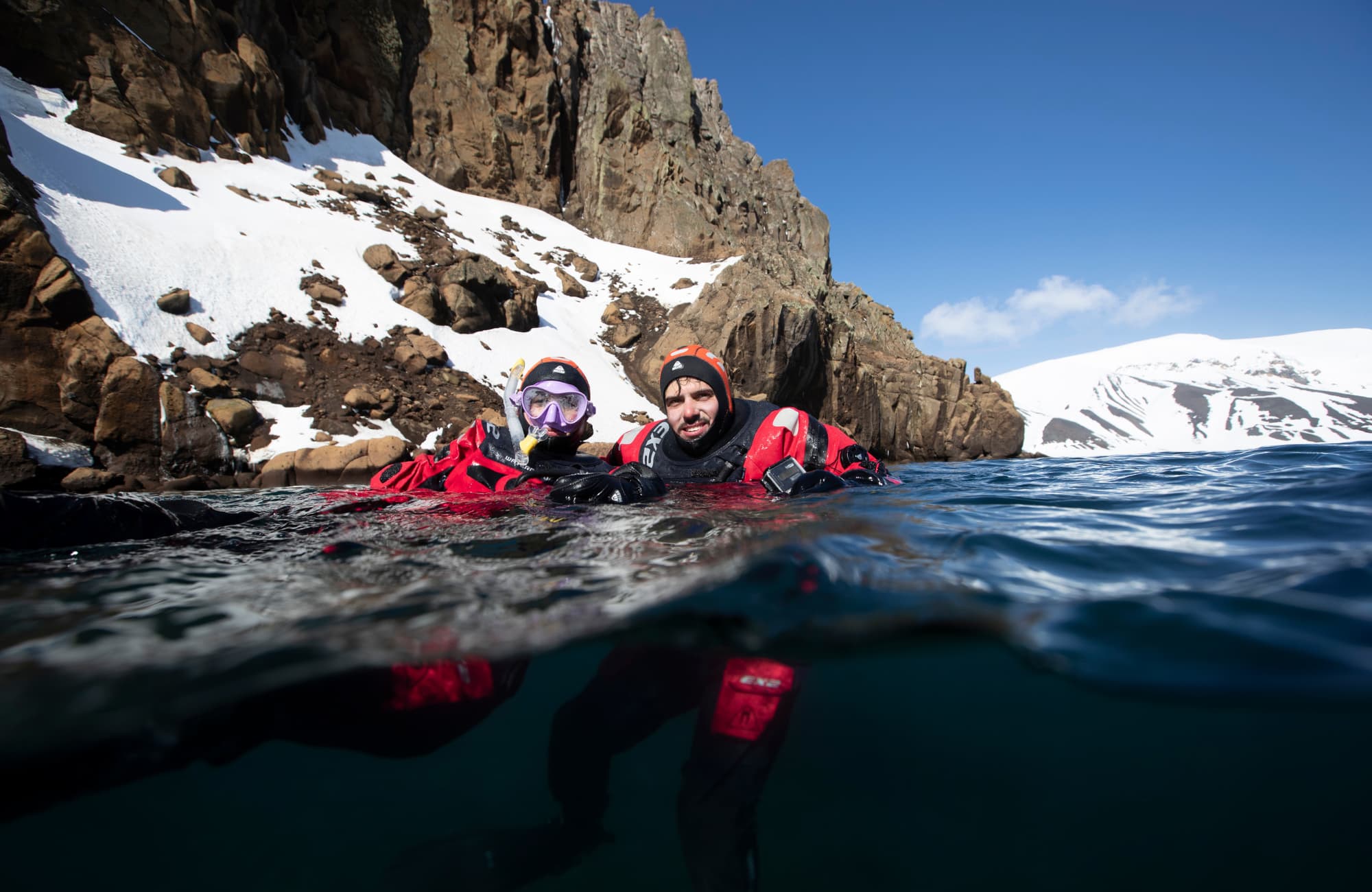
Sliding backwards off the side of the Zodiac, I hold my snorkel mask in place with one hand and brace for impact. Wearing two layers of thermals and three pairs of ski socks underneath a dry suit, I’m cautiously confident that I’m adequately insulated against the elements. I’m somewhat less prepared for the sting of the icy water on my exposed cheeks as I plunge in, but the pain is swiftly forgotten when I remember—I’m snorkelling in Antarctica!

Polar snorkelling is just one of several optional non-motorized activities available on small-ship expedition cruises operated by Aurora Expeditions. And I’m intrigued. I could happily spend every day of my voyage to Antarctica gazing upon the continent’s soul-stirring landscapes from the ship’s observation deck, but as we pick our way around the enormous tabular icebergs of the Weddell Sea, I wonder what it might feel like to explore beneath the surface.
As my eyes adjust to a saltier view of the White Continent, I discover that the water is absolutely teeming—fortunately not with razor-toothed leopard seals or orcas, but with tiny gelatinous creatures Antarctica’s penguins apparently love snacking on. The visibility is surprisingly low for such a calm day, but it only adds to the otherworldly vibe as I slowly flipper alongside an iceberg, its bummock glowing a brilliant shade of aquamarine in the teal abyss.


Around the 20-minute mark I begin to lose feeling in my fingers and start looking around for the Zodiac. But the first thing I lock eyes on is a flipper. Squeals of delight—albeit muffled by snorkels—pierce the still afternoon air as it dawns on the members of our snorkelling group that we’ve been joined by a playful young fur seal. Watching it effortlessly twist and weave between us as we bob around much less gracefully in our ultra-buoyant dry suits, I’m awestruck by this incredible creature, trusting us completely to share this wild place with him.
It’s such a special moment, I’m reluctant to recount it to fellow passengers back on board in fear of inciting mass FOMO. But no one misses out on the fun on Aurora Expeditions’ ships, which carry approximately 132 passengers in polar regions. With Antarctic tourism regulations restricting landings to 100 passengers at a time, this means every Aurora passenger has an opportunity to explore terra firma (without having to take turns) when the ship anchors, if you’re not already taking part in an optional activity such as snorkelling, kayaking, scuba diving or skiing. History buffs can even opt to follow in the footsteps of explorer Sir Ernest Shackleton on foot or by ski on the Shackleton’s Crossing option offered on select expeditions. Should you feel like staying on board instead, Aurora Expeditions’ supports a number of fun but meaningful citizen science projects you can opt to get involved in at your leisure.


With no landing option on this particular afternoon, most passengers who pass on snorkelling instead pile into Zodiacs to ogle icebergs up-close on a more intimate cruise, pausing to marvel at seals and penguins relaxing on these temporary frozen islands as snow falls softly on the surreal landscape.
By the time I’ve finally thawed out—which required a hot shower and a stiff drink—I’m absolutely exhausted. But I’d go polar snorkelling again in a heartbeat…perhaps with an extra layer of thermals for good measure.
Aurora Expeditions’ small ships are designed for adventure and their itineraries maximize your time off-ship to explore and connect with remarkable destinations. Aurora offers the most comprehensive activity program, supported by an experienced Expedition Team. Some activities are included in an expedition like Zodiac cruises and short hikes, while other like snorkelling, sea kayaking and skiing are optional and cost extra.


